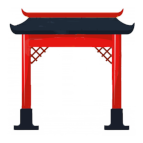| Meaning |

not good 艮
|
| Explanation |
This 良 is the character for "good", but since the accent is missing it is understood as "not good".
|
Used in these characters:
|
|
很
|
 |
|
JLPT HSK 1 |
|
| very (adverb of degree), quite, awfully
|
Left: to go 彳, right: not good 艮 ('good' would be 良, but here the accent 丶 is missing, thus 'not good')
(With the invention of the wheel they said this?) "Walking is not good, ... very!"

|
|
|
|
眼
|
 |
|
JLPT HSK 2 |
|
| eye, classifier for hollow things (wells, pots)
|
Left: eye 目, right: not good 艮 ('good' would be 良, but here the accent 丶 is missing, thus 'not good')
One eye (only) is not good, but it is still an eye.

|
|
|
|
跟
|
 |
|
JLPT HSK 3 |
|
| heel, to follow closely, to go with
|
Left: foot 足 (knee cap 口 and footprint 止), right: not good 艮 ('good' would be 良, but here the accent 丶 is missing, thus 'not good')
(Most often it hurts here:) The foot is not good at the heel.

|
|
|
|
根
|
 |
|
JLPT HSK 3 |
|
| root, basis, classifier for long slender objects (cigarettes)
|
Left: tree 木, right: 'not good' 艮 ('good' would be 良, but the accent 丶 is missing, thus 'not good')
(not usable as timber) The tree is not good at the roots. (... or if it is too slender)

|
|
|
|
银
|
 |
|
JLPT HSK 3 |
|
| silver, silver-colored
|
Left: metal/gold 钅/金 (= Covered  in the ground 土 are 2 gold nuggets 丷), right: "not good" 艮 ('good' would be 良, but here the accent 丶 is missing, thus 'not good') in the ground 土 are 2 gold nuggets 丷), right: "not good" 艮 ('good' would be 良, but here the accent 丶 is missing, thus 'not good')
(Gold would be better!) This metal is not good: It is only silver!

|
|
|
|
腿
|
 |
|
JLPT HSK 3 |
|
| leg, lower extremities
|
Left: body part 月/肉, right: retreat 退 (The movement 辶 is not good 艮 if it is a retreat.)
The part of the body that can be retreated is the leg.

|
|
|
|
概
|
 |
|
JLPT HSK 4 |
|
| general, approximate
|
Left: tree 木, right: previous/before 既 (It is 'not good' 艮 with a 'false tusk' 牙, that's already since, ..)
A tree and a not-good tusk (as drawn in this character) are approximately in general (the same)?

|
|
|
|
即
|
 |
|
JLPT HSK 4 |
|
| immediate, prompt, namely, to approach
|
Left: simplification of "not good" 艮 ('good' would be 良, but here the accent 丶 is missing, thus 'not good'), right: bent person 卩
Not good, this person should bow down: Immediately!

|
|
|
|
既
|
 |
|
JLPT HSK 4 |
|
| already, since, both... (and...)
|
Left: not good 艮 ('good' would be 良, but here the accent 丶 is missing, thus 'not good'), right: (false tusk 牙)
It is not good with a false tusk, that's already since, ..

|
|
|
|
恨
|
 |
|
JLPT HSK 5 |
|
| to hate, bitterness, to regret
|
Left: feeling 忄, right: not good 艮 ('good' would be 良, but here the accent 丶 is missing, thus 'not good')
Feelings are not good when they are hatred.

|
|
|
|
退
|
 |
|
JLPT HSK 5 |
|
| to retreat, to decline, to move back, to withdraw
|
Left: movement 辶, right: not good 艮 ('good' would be 良, but here the accent 丶 is missing, thus 'not good')
The movement is not good if it is a retreat.

|
|
|
|
限
|
 |
|
JLPT HSK 5 |
|
| limit, bound
|
Left: hill 阝, right: 'not good' 艮 ('good' would be 良, but here the accent 丶 is missing, thus 'not good')
A hill is not good, because it is a limit(ation).

|
|
|
|
艰
|
 |
|
JLPT HSK 5 |
|
| difficult, hard, hardship, terrible (task)
|
Left: hand 又, right: not good 艮 ('good' would be 良, but here the accent 丶 is missing, thus 'not good')
With a hand, that is not good, it's difficult.

|
|
|
|
恳
|
 |
|
JLPT HSK 5 |
|
| earnest
|
Left: 'not good' 艮 ('good' would be 良, but here the accent 丶 is missing, thus 'not good'), right: heart 心
A not-good heart is earnest.

|
|
|
|
良
|
 |
|
JLPT HSK 5 |
|
| good, very, very much
|
The same character 良 with a lid  would be food 食 would be food 食
Take the lid from the food: it looks good!

|
|
|
|
痕
|
 |
|
JLPT HSK 6 |
|
| scar, traces
|
Outside: disease 疒 (An ice-冫-cold building 广 makes sick.), below: not good 艮 ('good' would be 良, but here the accent 丶 is missing, thus 'not good')
The disease was not good, it left scars and traces.

|
|
|
|
慨
|
 |
|
JLPT HSK 6 |
|
| generous, sad
|
Left: feeling 忄, right: already, since 既 (It is 'not good' 艮 with a 'false tusk' 牙, that's already since, ..)
With feelings she is already rather generous.

|
|
|
|
狠
|
 |
|
JLPT HSK 6 |
|
| fierce, vicious, heartless
|
Left: wild animal 犭, right: 'not good' 艮 ('good' would be 良, but here the accent 丶 is missing, thus 'not good')
The wild animal is not good: It is fierce and vicious.

|
|
|
|
卿
|
 |
|
JLPT no HSK |
|
| high ranking official (old), honorific (old)
|
Outside: rabbit 卯 (Image of a rabbit's hole with a central passage and side chambers), inside: not good 艮 ('good' would be 良, but here the accent 丶 is missing, thus 'not good')
'You Rabbit!' is not good as an official honorific term.

|
|
|
|
垦
|
 |
|
JLPT no HSK |
|
| to cultivate, to reclaim (land)
|
Top: 'not good' 艮 ('good' would be 良, but here the accent 丶 is missing, thus 'not good'), bottom: earth 土
A 'not-good' earth needs to be: cultivated.

|
|
|
|
褪
|
 |
|
JLPT no HSK |
|
| to take off (clothes), to fade
|
Left: clothes 衤/衣, right: to retreat, decline 退 (The movement 辶 is not good 艮 if it is a retreat.)
Clothes are 'retreated', when they are: taken off.

|
|
|
|
唧
|
 |
|
JLPT no HSK |
|
| to splash, pump water, to whisper, to mutter
|
Left: mouth 口, right: immediate, prompt 即 (Not good 艮, this person should bow 卩 down, immediately!)
The mouth is not good, when during 'bowing down' sth. is: splashing out.

|
|
|
|
龈
|
 |
|
JLPT no HSK |
|
| to bite, to gnaw, gums (of the teeth)
|
Left: tooth 齿/齒 (Below the nose 止 an open mouth 凵 with teeth 人), right: 'not good' 艮 ('good' would be 良, but here the accent 丶 is missing, thus 'not good')
(They destroy something:) The teeth are not good when they: bite.

|
|
|
| Radicals are shown here that are similar either in appearance or meaning. |  |
|
At the page you get the memory phrases for learning the Chinese Hanzi. If you are learning the Japanese kanji, please follow this link. |
List of the characters |
List of the radicals
|

